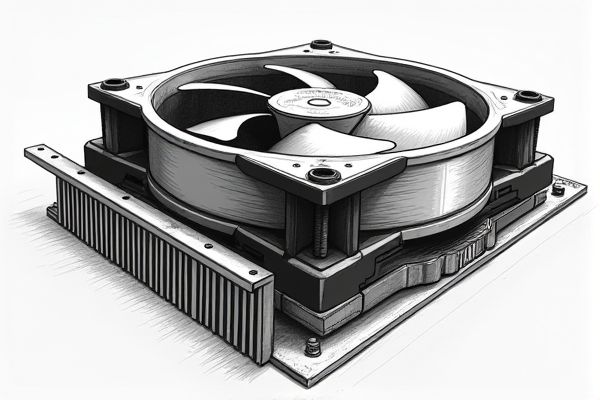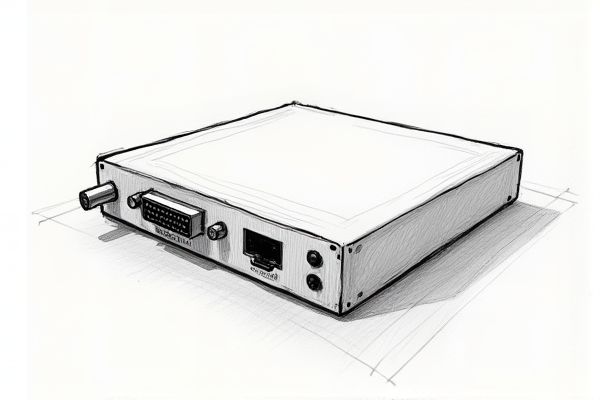In the rapidly evolving world of technology, finding the right CPU to power your computing needs is crucial. Whether you're a gamer, content creator, or casual user, the choice of CPU can significantly impact the performance and efficiency of your system. Brands like Intel and AMD continue to lead the market with their innovative processors, offering a range of options that cater to different needs and budgets. For those looking to make an informed decision on their next CPU purchase, explore the comprehensive list of top CPU brands below.

Illustration of cpu
Best brands of cpu in 2025
Intel
Intel remains a dominant force in the CPU market, holding a significant share across various segments. In Q1 2024, Intel accounted for 79.4% of the client CPU market and 76.4% of the server CPU market, although AMD has been gaining ground, particularly in the server segment where AMD's share increased to 23.6%. Despite this, Intel continues to lead in client PCs, securing a 78.9% market share in Q2 2024. Intel's product lineup, including the Intel Core Ultra and 14th gen processors, offers high performance and efficiency, catering to diverse needs from gaming to enterprise solutions. The company's strong presence in corporate PC sales and vast production capacity further solidify its position. For more details on their processor lineup, visit the Intel processor page.
AMD
AMD has solidified its position as a leading CPU producer, capturing 28.7% of the desktop market share in Q3 2024, a significant 9.6% annual gain, and achieving a record 33.9% revenue share in the server market. This growth is driven by the success of its Ryzen 7000 and 9000 series processors, as well as strong sales of EPYC processors, with the company's data center division generating $3.549 billion in quarterly revenue. AMD also holds 22.3% of the laptop processor market and 24.2% of the server segment. The company's innovative Zen architecture and high-performance 3D V-Cache processors have been key factors in its market share gains. AMD's revenue share in the desktop segment increased by 7.7% year-over-year to 27.3%. For more details, read the full report.
Qualcomm
Qualcomm is a leading producer of CPUs, particularly in the smartphone and semiconductor markets. As of 2023, Qualcomm held a 23% market share in smartphone application processors, trailing only MediaTek's 36% share. The company generated $35.82 billion in revenue in 2023, with China being its highest-grossing region, accounting for $22.382 billion. Qualcomm's QCT segment, which includes its CPU technologies, accounted for 84.82% of its revenue in 2023. The company is also strong in the automotive and IoT segments, with these combined generating $2.2 billion in revenue. For more detailed statistics about Qualcomm, you can visit their Qualcomm statistics page.
Apple
Apple dominates the Arm-based laptop market, holding a significant 90% share in 2022, driven by its self-designed M1 chip launched in 2020, which has enhanced power consumption and battery life. This migration has boosted Arm-based laptop market share from less than 2% to over 12% by the end of 2022. Apple's Macs also captured 10% of the worldwide and 16.1% of the U.S. personal computer market share in Q4 2023. The company's influence is further underscored by its growing market presence, despite overall PC market declines. Apple's innovative CPU designs continue to set industry standards. For more in-depth insights, visit the article on Arm-based market dynamics.
Samsung
Samsung is one of the leading producers of CPUs, having surpassed Intel as the world's biggest chipmaker by revenue for the first time in 2017 and maintaining this position for two years. As of 2023, however, Intel regained the top spot with a 9.1% market share, while Samsung held a 7.5% share, a significant decline from its 12.3% share in 2021. Samsung's chip revenue reached a record quarterly high of $20.3 billion in Q2 2022, capturing 12.8% of the global total. Despite challenges, Samsung remains a major player in the semiconductor industry, with plans to supply advanced memory chips to Nvidia and other strategic initiatives to regain its market advantage. The company's global semiconductor revenue was approximately $39.9 billion in 2023, though this marked a sharp decline from the previous year. For more detailed information, visit Samsung's Wikipedia page.
ARM Holdings
ARM Holdings is a leading producer of CPUs, renowned for its high-performance, low-cost, and energy-efficient IP solutions. With over 30 years of innovation, ARM technology powers more than 70% of the world's population, and 99% of smartphones run on ARM-based processors. By 2029, Arm CPUs are projected to power around 40% of notebooks sold, significantly increasing their market share from the current 18%. ARM's success is also evident in the server market, with the ARM-based servers segment expected to grow at a CAGR of 14.3% from 2024 to 2030. The company's architecture is trusted and widely adopted across various industries.
IBM
IBM is a renowned producer of CPUs, with a significant market share in the technology sector. As of Q3 2024, IBM holds a 9.58% market share in the computer hardware industry and 4.13% in the broader technology sector. IBM's CPUs, such as those used in the Watson system, are built on advanced technologies like the POWER7 processors, which provide 80 teraFLOPS of performance and utilize 16 terabytes of RAM. The company's commitment to innovation is evident in its DeepQA project and the successful deployment of Watson in various applications. IBM's CPUs are highly optimized for complex tasks, making them a preferred choice in several industries.
Huawei
Huawei is a leading global producer of CPUs, particularly notable for its advancements in the data center and AI sectors. In 2018, Huawei launched its ARM-based CPU, the Kunpeng 920, and the TaiShan series servers, which are designed for big data, distributed storage, and ARM-native applications. Despite facing challenges such as the U.S. blacklist, Huawei continues to innovate, with significant investments in R&D and a strong patent portfolio, including 87,805 granted patents as of 2018. Huawei's CPUs are integral to its 5G and AI solutions, which have received widespread acclaim for their performance and efficiency. The company's commitment to digital transformation and technological innovation solidifies its position as a major player in the CPU market. For more detailed insights, you can explore their 2018 Annual Report.
NVIDIA
NVIDIA stands as a dominant force in the GPU market, holding an impressive 88% market share in Q1 2024, a significant increase from 80% in the previous quarter, primarily at the expense of AMD and Intel. This dominance is a result of its innovative products, such as the RTX 4000 GPUs, and its strong presence in both gaming and data center markets. NVIDIA's revenue from its Graphics business segment reached $13.517 billion in fiscal 2024, with the company also leading in AI and machine learning applications. The company's strategic investments in research and development have propelled its market share to new heights, making it a leader in the industry since 2014. NVIDIA's near-monopoly in the GPU market underscores its technological and market leadership. For more detailed information, visit NVIDIA's official website.
MediaTek
MediaTek has emerged as a leading producer of CPU chipsets, particularly in the 5G smartphone market, with its market share rising to 29.2% in Q1 2024 from 22.8% in Q1 2023. This growth is driven by a 53% increase in shipments of MediaTek-powered 5G smartphones, reaching 53 million units in Q1 2024. MediaTek's success is largely attributed to its dominance in the mid to low-end price tier, especially with the surge in shipments of 5G smartphones priced under $250, which saw a 62% increase from 38.7 million in Q1 2023 to 62.8 million in Q1 2024. This strategic focus has allowed MediaTek to outpace Qualcomm Snapdragon, whose market share decreased to 26.5% in the same period. MediaTek's strong ties with Chinese smartphone OEMs like Transsion and Xiaomi have also contributed to its market expansion. For more insights into MediaTek's competitive edge over Qualcomm, explore this detailed analysis of the 5G smartphone chip market.
















Leave a Reply
Your email address will not be published.